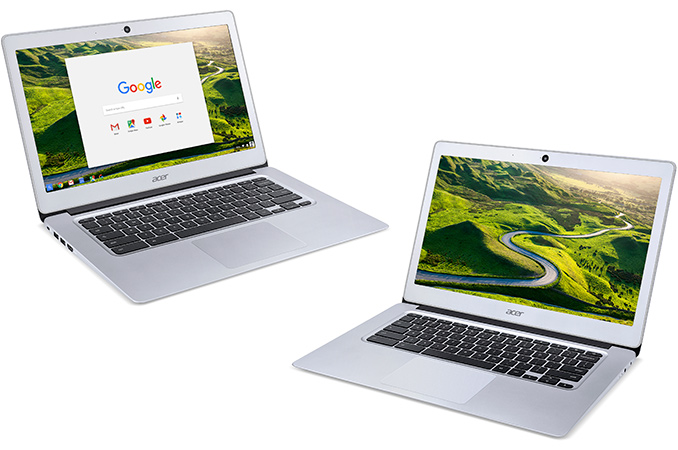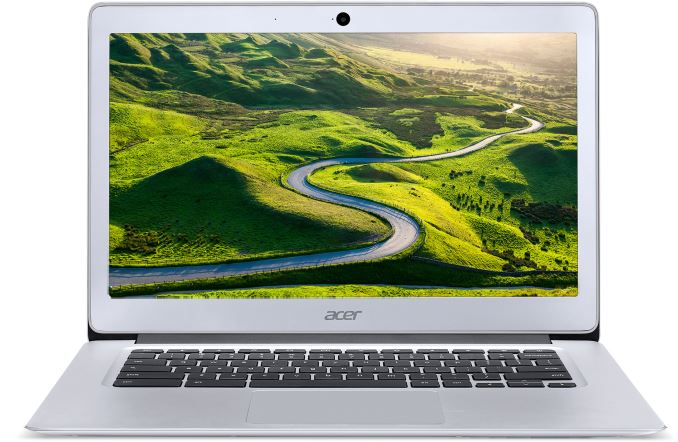Acer Unveils New Chromebook 14 with Up to 14-Hour Battery Life
by Anton Shilov on March 30, 2016 2:40 PM EST
Acer this week introduced its new family of Chromebooks that wed performance with portability. The new laptops feature multi-core x86 microprocessors, 14” displays as well as aluminum chassis. Even in its most advanced configuration, the Chromebook 14 costs only $299. Acer traditionally positions its Chromebooks as solutions for students as well as customers on a budget, who need basic computing and do not want to invest a lot.
Several years ago, personal computers running Google’s Chrome operating system were considered as cheap alternatives to Windows-based PCs, which is why they used affordable components and could not boast solid performance, despite the lightweight OS. Eventually, such PCs became relatively popular and manufacturers started to use more advanced ingredients, such as IPS displays or microprocessors with higher performance. Google itself introduced its Chromebook Pixel laptop in 2013 (and updated it in 2015), targeting premium buyers. The Chromebook Pixel is one the most advanced and powerful Chromebooks ever made thanks to its Core i7 “Broadwell” processor, a display with 3:2 aspect ratio as well as an aluminum body. Google’s Pixel demonstrated to other PC makers that it is possible to build premium Chrome OS-based notebooks and they followed with more advanced Chromebooks. The new Acer Chromebook 14 is not as powerful as the Pixel, but it is clearly a step into its direction with a high-resolution display as well as an all-aluminum chassis.
The Acer Chromebook 14 (CB3-431) features, as the name suggests, a 14” IPS display with 1920×1080 or 1366×768 resolution as well as 170-degree viewing angles and an anti-glare coating. Unlike the Chromebook Pixel, Acer’s new laptops have 16:9 aspect ratio with all of its advantages for video viewing and disadvantages for Internet surfing. The model with higher resolution can work on one battery charge for 12 hours, whereas the Chromebook 14 with 1366×768 resolution boasts with up to 14-hour battery life on a single charge.
The Chromebook 14 laptops are based on Intel Celeron “Braswell” processors with two (Celeron N3060) or four (Celeron N3160/N3150) cores featuring the Airmont micro-architecture and up to 1.60 GHz clock-rate, Intel’s Intel Gen 9 graphics core with 12 execution units as well as up to 6 W TDP. Unlike Google’s Chromebook Pixel as well as Acer’s Chromebook 15, the Chromebook 14 cannot integrate a high-performance CPU featuring Broadwell micro-architecture, but that was certainly a trade-off between the price and portability.
| Acer Chromebook 14 Specifications | |||
| Acer Chromebook 14 full HD | Acer Chromebook 14 HD | ||
| Screen Resolution | 1366×768 | 1920×1080 | |
| CPU | Dual-core Intel Celeron N3060 or Quad-core Intel Celeron N3150/3160 | ||
| Graphics | Intel HD Graphics 400/405 (Gen 8, 12 execution units) | ||
| RAM | 2 GB or 4 GB LPDDR3 | ||
| Storage | 16 GB or 32 GB of eMMC storage | ||
| Wi-Fi | 2x2 MIMO 802.11ac Wi-Fi module | ||
| Bluetooth | Bluetooth 4.2 | ||
| USB | 2 USB 3.0 ports | ||
| HDMI | One HDMI output | ||
| Other I/O | Microphone, stereo speakers, audio jack | ||
| Thickness | 17 mm / 0.66" | ||
| Weight | 1.55 kilograms / 3.42 pounds | ||
| Price | $299 for the launch model | ||
Acer equips its Chromebook 14 laptops with 2 GB or 4 GB of LPDDR3 RAM (which is a good news for battery life), 16 GB or 32 GB of eMMC solid-state storage as well as a dual-band 2x2 MIMO 802.11ac Wi-Fi module with Bluetooth 4.2. The systems also feature a 720p webcam, a 3.5-mm mini jack, a microphone, stereo speakers, two USB 3.0 ports as well as an HDMI output.
The Chromebook 14 from Acer is 17 mm thick and weighs 1.55 kilograms, which is in line with many portable laptops. Acer claims that its fanless cooling system is enough to cool-down Intel’s Celeron CPU with a 6 W TDP, which is why the Chromebook 14 has no fans at all.
Acer did not say much about the price of its Chromebook 14. The launch model will be available next month with a Full HD display, 32 GB storage and 4 GB RAM starting at $299.99 in the U.S. and $399.99 (CAD) in Canada. Other Chromebook 14 models will sport lower amount of storage and RAM as well as a lower-resolution screen, but also a longer battery life. Their prices are unknown, but will clearly be different in different countries.

















42 Comments
View All Comments
JoeyJoJo123 - Wednesday, March 30, 2016 - link
Dead on arrival.Worthless OS which will lead to a device with no sales.
It might get bought in bulk by school districts or other institutions that want to offer "loaner" type laptops at a fraction of the cost of a standard Windows laptop, but consumer sales show that there's little demand for chromebooks.
T1beriu - Wednesday, March 30, 2016 - link
Yeah, well, that's just, like, your opinion, man.Samus - Thursday, March 31, 2016 - link
He's probably never even used a Chromebook, so he doesn't even understand how useful they actually are to average people. I recommend them to the aging population all the time and they are always happy with them. Perfect with Netflix, web surfing, emailing, etc, you know, what 95% of retired people do on a PC.The icing on the cake isn't even the fact they cost very little, but that they are virtually uninfectable (is that a word? I'm making it a word.)
forgot2yield28 - Sunday, April 3, 2016 - link
95% of what most people do with a PC at home, for that matter. My brother has one at college, and I asked him if he wanted help buying a more capable laptop, and he said he was 100% happy with his Chromebook. You can definitely argue that they aren't ready to tackle the productivity needs of everyone, but they're anything but dead on arrival.lmcd - Wednesday, March 30, 2016 - link
Yea it doesn't look like Chromebooks have much further to grow beyond education. The lack of hardware support and painfully-slow adoption of HTML standards that would remedy this (in addition to no Linux CUPS for no apparent reason) mean that there's not a lot of value here.kupfernigk - Sunday, April 3, 2016 - link
Why bother with the weight of CUPS when there's Google Cloud Print or the proprietary options from Epson, HP and the like? A Chromebook is designed to be part of the Google infrastructure, and gcp works fine - I currently have two Epsons and an HP, two of which are business printers, connected .And what hardware support do I need for a lightweight laptop for use when out, and around the house?
This one will probably replace my Samsung 550, which so far has survived three years of something approaching abuse and still works perfectly despite the dents and scratches, but I would like a bigger screen.
extide - Wednesday, March 30, 2016 - link
Any actual stats to back that up or is it just some useless jabber?T1beriu - Wednesday, March 30, 2016 - link
I guess the 10K+ reviews of Chromebooks on Amazon are written just by school and other institutions' admins?damianrobertjones - Wednesday, March 30, 2016 - link
Or google themselves.name99 - Thursday, March 31, 2016 - link
Ah, the conspiracy theory. The last refuge when the facts (or should I say "facts"?) go against you.